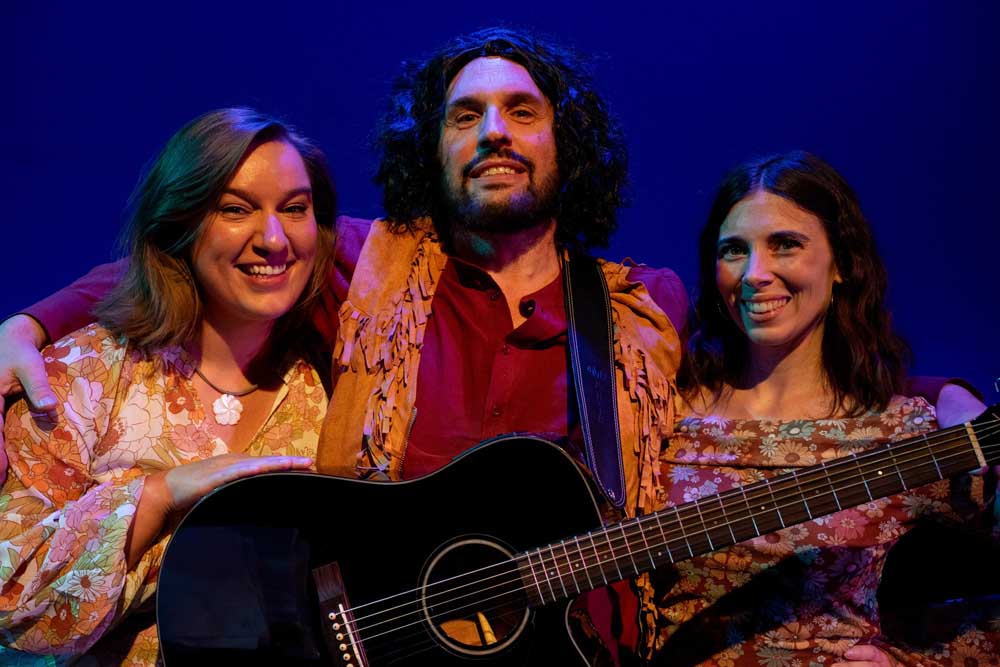THEATER REVIEW: ‘It’s a wild world’ at Camelot
Published 6:00 am Wednesday, October 23, 2024

- Julia Funk, left, Erik Connolly, and Lyndsay Nashington star in Camelot Theatre's production "Spotlight on Cat Stevens."
“I let my music take me where my heart wants to go.”
These are lyrics from “Wind,” a musically mystical tone poem set to music. It was written and sung by one of the most creative folk artists to emerge from the late 1960s. A gifted singer-songwriter who sometimes takes a back seat to other artists of the time — such as Joni Mitchell or Crosby, Stills, Nash & Young — yet remains one of the unsung folk heroes from a remarkable era. This musician’s name? Cat Stevens, or as of late, Yusuf/Cat Stevens.
You can now catch Erik H. Connolly embodying the heart and soul of Stevens and his music in the production, “Spotlight on Cat Stevens,” on stage through Nov. 3 at the Camelot Theatre in Talent.
Besides having the voice — rich and self-assured — Connolly has it all down: Stevens’ mannerisms, gentle persona and musical expression. Of course, it doesn’t hurt he’s also accompanied by some of the best and most accomplished musicians in the valley — Musical Director Karl Iverson on keyboards, Micah McCaw on guitar, Larry Smith on bass and Steve Sutfin on drums.
Of all the “Spotlight” shows presented at Camelot in 2024, this one is the most pulled together, thanks to Director Zaq Wentworth. The audio by Nick Chandler, live sound engineer, is well-balanced and not overly loud, which hasn’t always been the case with previous “Spotlight” productions.
Narrators and backing vocalists Julia Funk and Lyndsay Nashington work well with Connolly’s easy-going vocalizations as he saunters around the stage.
Playing at the infamous Troubadour in L.A. in the ’60s, Stevens was the epitome of a true folk artist. His poetry explored subjects ranging from gratitude as evidenced in “Moonshadow,” to the dangers of environmental collapse seen in the lyrics of “Where Do the Children Play?” His work ripples like waves in a pond, reflecting love, beauty, passion and yes, even some occasional righteous anger.
The show’s comprehensive retrospective, accurately scripted by Connolly, takes us from Stevens’ youth in England working in his parent’s cafe through his early performance and recording years. The popularity of Stevens’ early albums, especially “Tea for the Tillerman,” which had three major hits, pushes him toward stardom. Then, worn down from a brutal, fast-paced recording and performance agenda, Stevens contracts tuberculosis. The experience humbles him.
After another brush with death in California and a spiritual awakening, Stevens embarks on a quest to find a spiritual practice he can relate to. He discovers the Qur’an, decides to change his name to Yusuf and converts to Islam. He also sells his guitars, leaves the musical world behind, marries, has a family and immerses himself in charitable and philanthropic work.
Yusuf/Cat Stevens, as he now refers to himself, returned to singing, songwriting and performance in 2006. In 2014, he was inducted into the Rock & Roll Hall of Fame. Stevens’ has recorded 36 albums, sold over 100 million records worldwide, and according to Universal Publishing Group, his music has had over 2 billion streams.
Through all that, what stays with us are the simple melodies and flowing lyrics.
There’s a plea from a caring man to his departing girlfriend: “Oh baby, baby it’s a wild world / It’s hard to get by just upon a smile;” his praise for a new day, “Morning has broken like the first morning / blackbird has spoken like the first bird / praise for the singing, praise for the morning / praise for them springing fresh from the world.”
Keyboardist Iverson inserts the song’s Baroque-style musical bridges beautifully.
Some songs are sung as lilting melodies, others are jarring, with Stevens’ signature way of stacking several notes at the end of a musical line, slowing them down as if the notes have suddenly slammed into a stop sign. This is evident in pieces like “Can’t Keep It In,” a singable dialog. His music at times is so relatable, one can see why it’s so well-suited for musical theater.
In the end, Yusuf/Cat Stevens wants us to pay attention. He may be the folk composer who has tried to offer us the most hope.
This production is well worth seeing. Let the music take you “where your heart wants to go.”






